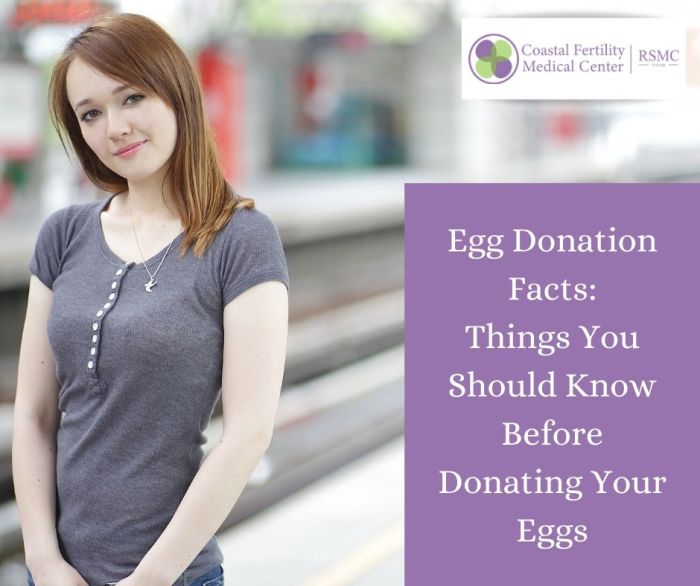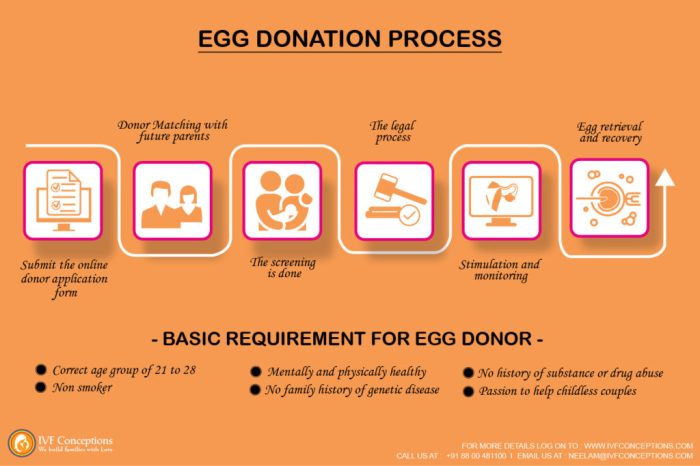Embarking on the topic of egg donation, we delve into the crucial question: how old do you have to be to donate eggs? This comprehensive guide will explore the age requirements, medical screening, and emotional considerations involved in this selfless act.
To become an egg donor, one must meet certain age criteria, which vary across countries. Understanding these age limits and the reasons behind them is essential for potential donors.
Age Requirements: How Old Do You Have To Be To Donate Eggs
Egg donation is a procedure where a woman (the donor) provides her eggs to be fertilized with sperm in order to create an embryo. To be eligible as an egg donor, there are specific age requirements that must be met.
These requirements vary from country to country, but generally, there is a minimum and maximum age limit.
Minimum Age Requirement
The minimum age requirement for egg donation is typically set to ensure that the donor is mature enough to understand the implications of the procedure and to make an informed decision about donating her eggs. In most countries, the minimum age requirement is 18 years old.
Reasons for the Age Limit
There are several reasons why there is a minimum age requirement for egg donation. These include:
- To ensure that the donor is emotionally and physically mature enough to handle the process.
- To reduce the risk of psychological problems for the donor later in life.
- To ensure that the donor is fully informed about the risks and benefits of egg donation.
Examples of Different Age Requirements, How old do you have to be to donate eggs
The minimum age requirement for egg donation varies from country to country. Some examples include:
- United States: 18 years old
- United Kingdom: 18 years old
- Canada: 18 years old
- Australia: 18 years old
- New Zealand: 20 years old
Medical Screening
Before becoming an egg donor, potential candidates must undergo a thorough medical screening process to ensure their physical and mental well-being. This screening helps identify any underlying medical conditions or risk factors that may affect the donor’s health or the viability of their eggs.
The medical screening typically involves a comprehensive physical examination, a review of the donor’s medical history, and a series of blood tests and genetic screenings. These tests are designed to assess the donor’s overall health, fertility potential, and any potential genetic disorders.
Eligibility Criteria
To be eligible as an egg donor, candidates must meet certain criteria, including:
- Being between the ages of 21 and 35 (some clinics may have slightly different age ranges)
- Having a healthy body mass index (BMI)
- Not having a history of smoking or excessive alcohol consumption
- Having regular menstrual cycles
- Not having any major medical conditions or genetic disorders
Physical and Mental Health
Egg donors must meet specific physical and mental health requirements to ensure the safety and well-being of both the donor and the recipient. Maintaining a healthy lifestyle is crucial for optimal egg quality and donation success.
If you’re wondering about the age requirement for egg donation, you’re in the right place. But hold up, if you’ve recently had gastric bypass and are puzzled about why the weight loss isn’t happening as expected, check out this article: Why Am I Not Losing Weight After Gastric Bypass . Now, back to egg donation.
The minimum age is typically around 21, with an upper age limit of 35 or 40, depending on the clinic.
Physical health requirements include a healthy weight, regular menstrual cycles, and no history of certain medical conditions that could affect fertility. Mental health screening is also essential to assess the donor’s emotional stability and readiness for the donation process.
Lifestyle Factors
Lifestyle factors can significantly impact egg donation outcomes. These include:
- Nutrition:A balanced diet rich in fruits, vegetables, and whole grains provides essential nutrients for egg production.
- Exercise:Regular exercise helps maintain a healthy weight and improves overall well-being, which can benefit egg quality.
- Smoking:Smoking damages eggs and reduces their viability. Egg donors must be non-smokers.
- Alcohol consumption:Excessive alcohol intake can interfere with egg production and quality.
- Caffeine:Moderate caffeine consumption is generally acceptable, but excessive amounts can affect fertility.
Emotional Considerations
Egg donation can evoke a range of emotions, both challenging and rewarding. Donors may experience feelings of altruism, empowerment, and a sense of purpose. However, they may also face emotional challenges, such as hormonal fluctuations, anxiety about the recipient’s outcome, and potential feelings of loss or grief.
To support donors through these experiences, various support systems are available. Fertility clinics often provide counseling and emotional support throughout the process. Donor support groups offer a safe and confidential space for donors to connect with others going through similar experiences.
Additionally, online forums and social media platforms provide opportunities for donors to share their stories and receive encouragement from the community.
Donor Testimonials
“I donated my eggs because I wanted to help someone else experience the joy of parenthood. It was an emotionally challenging journey, but also incredibly rewarding to know that I had played a part in creating a new life.”
“Egg donation was a difficult decision, but I’m so glad I did it. It’s not always easy, but it’s one of the most fulfilling things I’ve ever done.”
Legal and Ethical Implications

Egg donation involves legal and ethical considerations to ensure the well-being of donors and recipients.
Consent Process
Donors must provide informed consent before undergoing the procedure. This includes understanding the risks, benefits, and legal implications of donation. They must also be of legal age and mentally competent to make such decisions.
Donor Rights
Donors have the right to privacy, confidentiality, and fair compensation. They should be informed about the potential impact of donation on their health, future fertility, and emotional well-being.
Laws and Regulations
Various laws and regulations govern egg donation to protect donors and recipients. These include:
- Age restrictions for donors
- Medical screening requirements
- Informed consent procedures
- Compensation limits
- Protection of donor privacy
These regulations ensure that egg donation is conducted ethically and responsibly.
Donor Compensation
Egg donors receive compensation for their time, effort, and potential health risks involved in the donation process. Compensation can vary depending on factors such as the donor’s age, health, and the location of the clinic.
Compensation may include:
- A flat fee
- Reimbursement for expenses (travel, lodging, medical procedures)
- A combination of both
Factors Influencing Compensation
Factors that can influence compensation include:
- Age and health:Younger and healthier donors tend to receive higher compensation.
- Location:Compensation rates can vary significantly depending on the country and region.
- Clinic reputation:Prestigious clinics with a high success rate may offer higher compensation.
- Demand:The supply and demand for eggs can also impact compensation.
Compensation Rates in Different Countries
Compensation rates for egg donors vary widely around the world:
- United States:$5,000-$15,000
- Canada:$5,000-$8,000
- United Kingdom:£750-£2,500
- Australia:$5,000-$10,000
Long-Term Effects
Egg donation is a relatively new procedure, and there is still limited research on its long-term effects. However, some studies have suggested that egg donation may be associated with an increased risk of certain health problems, such as ovarian cancer and premature menopause.
The risks of egg donation are generally considered to be low, but it is important to be aware of the potential risks before making a decision about whether or not to donate eggs.
To donate eggs, you typically need to be between the ages of 21 and 35. If you’re looking for information on how to reduce swelling in your leg after hip replacement, check out this helpful article: how to reduce swelling in leg after hip replacement . Returning to the topic of egg donation, it’s important to meet certain health and lifestyle criteria to be eligible.
Ovarian Cancer
Some studies have suggested that egg donation may be associated with an increased risk of ovarian cancer. However, the evidence is conflicting, and more research is needed to determine whether or not there is a causal link between egg donation and ovarian cancer.
Premature Menopause
Egg donation may also be associated with an increased risk of premature menopause. This is because the ovaries are stimulated to produce multiple eggs during the egg donation process, which can lead to a decrease in the number of eggs remaining in the ovaries.
Alternative Options

For women who are not eligible to donate eggs, there are several alternative options available. These options vary in terms of success rates, cost, and potential risks. It is important to consult with a fertility specialist to determine the best option for each individual.
Adoption
Adoption is a legal process that allows a child to become a permanent member of a family. There are many different types of adoption, including international adoption, foster care adoption, and private adoption. The process of adoption can be lengthy and expensive, but it can be a rewarding experience for both the adoptive parents and the child.
Surrogacy
Surrogacy is a process in which a woman (the surrogate) carries and delivers a baby for another woman (the intended mother). The intended mother provides the eggs, which are fertilized with sperm from the intended father or a donor. The surrogate then carries the pregnancy to term and gives birth to the baby.
Surrogacy can be a complex and expensive process, but it can be a successful option for women who are unable to carry a pregnancy themselves.
Donor Sperm
Donor sperm is an option for women who are unable to use their own partner’s sperm. Donor sperm can be used to fertilize eggs in vitro (IVF), or it can be used in intrauterine insemination (IUI). Donor sperm is a relatively affordable option, and it can be a successful option for women who are unable to conceive with their own partner’s sperm.
Egg Donation
Egg donation is an option for women who are unable to use their own eggs. Donor eggs can be fertilized with sperm from the intended father or a donor. The fertilized eggs are then implanted into the uterus of the intended mother.
Egg donation can be a successful option for women who are unable to conceive with their own eggs, but it is important to note that there are risks associated with egg donation, including the risk of ovarian hyperstimulation syndrome (OHSS).
To donate eggs, you typically need to be between 21 and 35 years old. However, if you’re experiencing hip pain due to bursitis, you might be wondering if a chiropractor can help. Chiropractors can assess your hip and adjust it to relieve pain and improve mobility.
Once your hip pain is under control, you can focus on other important things, like figuring out the age requirements for egg donation.
Success Rates

The success rates of egg donation vary depending on several factors, including the age and health of the donor, the recipient’s age and fertility status, and the specific fertility treatment used.
In general, younger donors have higher success rates than older donors. Women under 35 have a success rate of around 50%, while women over 40 have a success rate of less than 20%. The recipient’s age also plays a role, with younger recipients having higher success rates than older recipients.
Factors Influencing Success Rates
- Age of the donor
- Health of the donor
- Age of the recipient
- Fertility status of the recipient
- Type of fertility treatment used
The type of fertility treatment used can also affect the success rate. In vitro fertilization (IVF) is the most common type of fertility treatment used with egg donation, and it has a success rate of around 30-40%. Intracytoplasmic sperm injection (ICSI) is a more specialized type of IVF that can be used to improve the success rate in cases where the male partner has low sperm count or motility.
ICSI has a success rate of around 50-60%.
Overall, the success rates of egg donation are good, and many couples who use egg donation are able to achieve a successful pregnancy.
Final Thoughts
Navigating the journey of egg donation requires a holistic approach, encompassing physical, mental, and emotional well-being. Donors must undergo rigorous medical screening to ensure their suitability. The emotional challenges and rewards associated with egg donation are profound, highlighting the importance of support systems and open communication.
Answers to Common Questions
What is the minimum age to donate eggs?
The minimum age to donate eggs varies depending on the country. In the United States, the minimum age is typically 21, while in other countries, it can be as low as 18.
Are there any age restrictions for egg donation?
Yes, there are typically upper age limits for egg donation. In the United States, most clinics set the maximum age at 35, while in other countries, it can be as high as 40.
Why are there age limits for egg donation?
Age limits for egg donation are in place to ensure the health and safety of both the donor and the recipient. Egg quality and quantity decline with age, and older donors are more likely to experience complications during the donation process.






